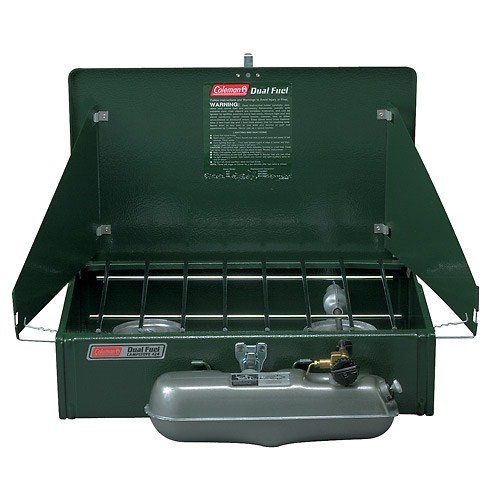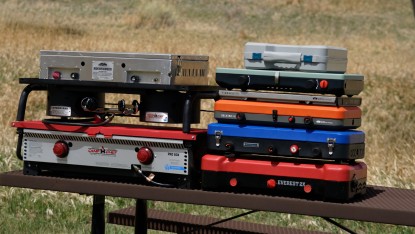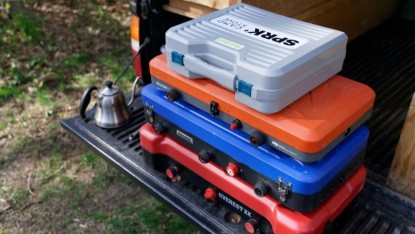Coleman Dual Fuel 2-Burner Review
Our Verdict
Our Analysis and Test Results
Group Cooking
The Coleman Dual Fuel has the smallest cooking surface of the two-burner stoves we tested. You can barely fit two medium-sized pots or pans. But the bigger drawback is that the left burner can never be turned up past the right burner. This means a lot of shuffling. Want to boil water on the left burner but turn down the heat on the right burner? No luck. You need to switch places.
Time to Boil
The right burner packs an incredible amount of heat in a low-BTU number. This is the stove that made us rethink how import BTU ratings are. It “only” has has 7,500 BTU on the right (main) burner, but somehow boiled water almost as fast as the Camp Chef Pro 60X which has 30,000 BTUs in each burner. Go figure. In fact, the little burner is so powerful, we found we couldn't leave on full blast with a bot without burning the paint off the side of the stove (not the best smell… eeww).
Cooking Simmering
This stove is average for cooking and simmering. One big downside is that using gas (even white gas) will often leave the bottom of your cookware black unless you are very aware of how the flame is burning (yellow flame = black pot bottom and blue flame = no marks). There is just no comparison to cooking with propane for clean burning flames.
One big downside: you can't really turn the stove off. If you turn the burner off completely, the flame keeps burning on low for minutes and minutes. So the only way to turn the stove off is to remove the fuel compartment and then find a safe place to set it. Even then, fuel keeps leaking out. The one minor advantage to this is that you can simmer very effectively for a few minutes.
Ease of set-up
Setting up this stove is a ritual. For the uninitiated, make sure you read the instructions 5 times and keep the stove away from anything flamable. Practice in daylight on your driveway… not at night in the middle of the forest on your first night of camping. We tried to light the stove without reading the manual (I mean, who really reads the manual until something goes wrong?!). The result, nothing… then giant ball of flames. Our problem was we didn't get the pressure right because it wasn't originally obvious to us when the pump was adding pressure and when it felt like it was adding pressure but was really just locked. After a few tries, we got the hang of it. Now its easy. But not nearly as easy as turning a propane tank on and pressing and auto-start button.
Ease of Care
This is the hardest stove to clean we tested. There is no stainless steel pan under the burners. Food drops off and gets hidden (at least the dark background hides it). When you are driving the stove around, the gas smell is much stronger than propane. We recommend airing the stove out for at least an hour before packing it in the car.
Wind Resistance
This is one of the most wind resistant stoves we tested. It has generous wind screens and the powerful burner keeps going even in high winds.
Packed size
This is a compact stove. However, if you store the fuel compartment in the stove (the logical place) this stove will really rattle when you drive. Plan on having some rags around to quiet the rattle.
Value
Since we were having trouble recommending this stove over propane stoves, we wondered if maybe the reason to get this stove is the cost of fuel. After all, those green Coleman 16oz propane tanks can run $5 each or $40 a gallon. If you only ran this stove off unleaded gas, you would save a lot of money over a stove using the green bottles. However, we don't recommend running the stove off unleaded gas station gas. The best results from this stove come from white gas which we recently purchased for $12 a gallon at our REI. Still a better deal than the green Coleman bottles. However, if you hook your stove up to a propane tank with an adapter hose, you again can be fueling your stove for $3-5 a gallon in propane (a much better deal than white gas). So it is hard to recommend a gas stove to the average camper. Maybe if you are camping where there is no propane the Coleman gas stove is a better deal.




